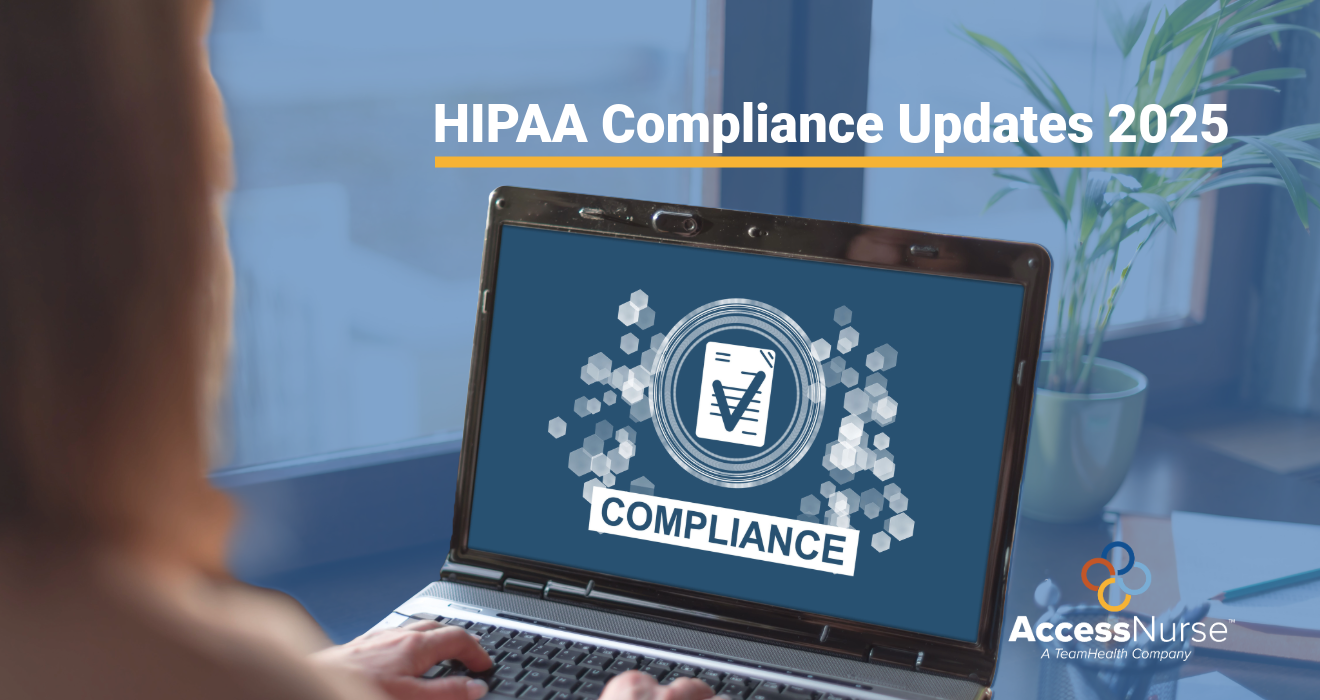HIPAA Compliance Updates 2025: What Healthcare Organizations Need to Know

Reviewed and Edited By:
Joe Chow, MD, Adult Medical Director, AccessNurse
In today’s healthcare environment, data privacy and security are not optional—they are essential. For nearly three decades, the Health Insurance Portability and Accountability Act (HIPAA) has set the standard for protecting sensitive patient information, from electronic health records (EHRs) to phone calls with providers. Each year brings new regulatory interpretations, enforcement priorities, and technology considerations that healthcare leaders must stay on top of.
As we continue to navigate through 2025, HIPAA compliance remains a central focus for healthcare organizations. Understanding the latest updates can help your team minimize risks, avoid costly penalties, and strengthen patient trust.
Key HIPAA Updates for 2025
While HIPAA itself hasn’t been overhauled, regulators have issued new guidance, and enforcement priorities are shifting. Here are the areas healthcare leaders should pay attention to in 2025:
1. OCR Enforcement Priorities
The Department of Health and Human Services’ Office for Civil Rights (OCR), which enforces HIPAA, has announced a continued focus on patient right of access cases. Providers that fail to deliver medical records within 30 days of a patient request are at increased risk of fines. In 2025, OCR is expected to apply stricter penalties for repeat violations and delayed responses.
2. Telehealth Privacy Standards
The rapid expansion of telehealth during and after the pandemic led to temporary enforcement discretion, but 2025 is tightening those rules. Providers must ensure that telehealth platforms meet security requirements, including encryption, secure logins, and patient consent for digital communications. The days of “good faith” exceptions are closing, and organizations that haven’t updated their telehealth protocols could face compliance issues.
3. Strengthened Technology Requirements
Cybersecurity threats in healthcare are on the rise. New HIPAA guidance emphasizes:
- Encryption by default for data in motion and at rest.
- Multi-factor authentication (MFA) as a standard expectation.
- Stronger requirements for monitoring access logs and detecting unauthorized entry into systems.
Additionally, with the growing role of AI-powered healthcare tools, OCR has cautioned that patient data used to train or operate AI systems must be fully de-identified or protected under HIPAA standards.
4. Interplay with State Privacy Laws
State-level privacy laws, such as California’s Consumer Privacy Rights Act (CPRA) and similar regulations in states like Texas and Colorado, are increasingly intersecting with HIPAA. In 2025, organizations must prepare for overlapping compliance obligations. While HIPAA generally preempts state laws, providers operating across multiple states need to ensure they are aligned with both federal and state privacy standards.
What Healthcare Organizations Should Do Now
The 2025 updates make it clear: compliance is not a one-time effort but an ongoing commitment. Here are the top steps organizations should take this year:
- Update Policies and Procedures – Review compliance manuals and operational guidelines to reflect the latest HIPAA interpretations, particularly around telehealth and patient access rights.
- Conduct Workforce Training – Employees must understand how HIPAA applies to their daily tasks. Annual training should include digital communication protocols and cybersecurity awareness.
- Reassess Vendor Agreements – Business associate agreements (BAAs) should be reviewed to ensure third-party vendors meet updated security expectations.
- Perform Security Risk Assessments – Regular audits help identify vulnerabilities in systems and workflows before they become compliance issues.
- Document Everything – In the event of an audit, having proof of your compliance activities—training logs, risk assessments, updated BAAs—can significantly reduce penalties.
Common Compliance Mistakes to Avoid in 2025
Even well-meaning organizations can fall into avoidable compliance pitfalls. The most common issues OCR flags include:
- Delayed record responses – Exceeding the 30-day requirement for patient record requests.
- Unsecured communication channels – Using personal email, text messaging, or non-compliant apps to share PHI.
- Weak cybersecurity measures – Failing to implement MFA or relying on outdated encryption protocols.
- Vendor oversight gaps – Assuming third-party vendors are compliant without conducting due diligence or monitoring.
Avoiding these mistakes not only protects patient information but also saves organizations from reputational and financial damage.
How AccessNurse Supports HIPAA Compliance
For healthcare organizations, compliance can feel overwhelming—especially when paired with the pressures of patient care. That’s where AccessNurse can help.
As the nation’s leading provider of medical call center solutions and nurse triage services, AccessNurse operates with HIPAA compliance at the core of every interaction. Our services include:
- Secure Communication – Every patient call is managed using processes that protect PHI and align with HIPAA standards.
- Trained Nursing Staff – Our nurses are thoroughly trained in HIPAA compliance, ensuring patient information is handled with care.
- Partnership Approach – We work as an extension of your team, providing the infrastructure, staffing, and protocols that reduce compliance risk.
- 24/7 Availability – By offering round-the-clock triage and call support, we help organizations maintain compliance while meeting patient needs anytime, anywhere.
Partnering with AccessNurse allows healthcare leaders to focus on patient care while knowing their communication workflows remain secure and compliant.
Final Thoughts
HIPAA compliance in 2025 is about more than meeting regulatory checkboxes—it’s about building trust with patients and safeguarding the foundation of your organization. By staying informed of enforcement priorities, updating security protocols, and partnering with compliant vendors, healthcare providers can reduce risks and strengthen patient relationships. At AccessNurse, we take compliance seriously because we know patient trust is invaluable. To learn how our nurse triage and call center services can support your compliance goals, contact us today.



